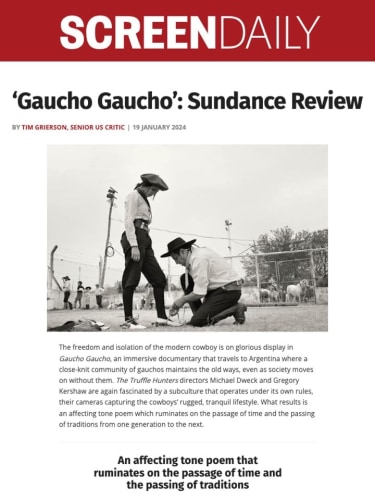‘Gaucho Gaucho’: Sundance Review
Screen Daily
01/19/2024
Back
’The Truffle Hunters’ filmmakers return to document the rhythms of modern cowboy life on the plains of Argentina
By Tim Grierson, Senior US Critic
‘GAUCHO GAUCHO’ Sundance Review
Dirs: Michael Dweck, Gregory Kershaw. US/Argentina. 2024. 84mins
The freedom and isolation of the modern cowboy is on glorious display in Gaucho Gaucho, an immersive documentary that travels to Argentina where a close-knit community of gauchos maintains the old ways, even as society moves on without them. The Truffle Hunters directors Michael Dweck and Gregory Kershaw are again fascinated by a subculture that operates under its own rules, their cameras capturing the cowboys’ rugged, tranquil lifestyle. What results is an affecting tone poem which ruminates on the passage of time and the passing of traditions from one generation to the next.
Programmed in Sundance’s US Documentary Competition, Gaucho Gaucho benefits enormously from the big screen. The film is shot in silvery black-and-white, Dweck and Kershaw’s cinematography taking full advantage of the wide-open countryside, compelling skies and rolling hills that these cowboys call home. This is the third time the directors have been invited to Sundance — they previously showed The Truffle Hunters and The Last Race — and a warm reception for their return visit seems assured.
As befitting the intimate approach taken by the filmmakers, the documentary does not concern itself with introducing its subjects or interviewing them on camera. Instead, viewers eavesdrop on casual conversations between the gauchos, or watch as these men and women ride horses, herd cattle or compete at the rodeo. Because Dweck and Kershaw eschew backstories or exposition, the cowboys’ history is a mystery, which makes them seem timeless — these gauchos have always lived on these empty plains, and they always will.
One of Gaucho Gaucho’s earliest scenes is a hypnotic slow-motion tracking shot that follows three cowboys on horseback as they gallop across the barren terrain. This primal, poetic sequence succinctly sums up the allure of the outsider lifestyle, bathing the subjects in an almost mythic grandeur. But that initial heroic image is occasionally undercut later, as Dweck and Kershaw hint at the difficulties of working the land far from civilisation. This community values family and fellowship, but physical endurance and mental toughness are also important.
Indeed, the small glimpses we get of the gauchos’ interpersonal dynamics suggest a group that has learned to survive. Two older members reminisce about difficult weather conditions about 25 years ago that severely impacted the area. Younger cowboys listen attentively to their elders, who impart wisdom — and occasionally recall the good old days when they were courting some fresh-faced beauty.
Rather than imposing a narrative or even a particular point of view, Gaucho Gaucho simply drifts from moment to moment, letting us get lost in a place where the world seems to have stopped. Dweck and Kershaw’s crisp black-and-white visuals cannot help but romanticise this way of life, but the directors have no illusions about the toll it takes on the individuals.
The harsh conditions are alluded to in other ways, most notably through majestic shots of circling condors who ominously dot the sky, seeking prey. And Stephen Urata’s layered sound design is filled with the noises of nature, which can be either soothing or vaguely alarming. Gaucho Gaucho suggests that life is teeming all around the gauchos, even if it is rarely seen – maybe these cowboys are not so alone after all.
Inevitably, this languid documentary occasionally suffers from a certain sense of static as it adopts the laidback rhythms of its subjects, who are content to reside in the little slice of heaven that they have carved out for themselves. But that does not mean these cowboys are stuck in their ways: a younger female gaucho is shown literally learning the ropes, and her male elders only encourage her, suggesting that, even though this community has rejected modernity, they are still evolving with the times. As it began, the film ends on an arresting shot of a cowboy in slow-motion on his horse, the landscape stretching in front of him as far as the eye can see. Gaucho Gaucho celebrates those with room to roam.
Production company: Beautiful Stories
International sales: Submarine, info@submarine.com
Producers: Michael Dweck, Gregory Kershaw, Cameron O’Reilly, Christos V. Konstantakopoulos, Matthew Perniciario
Cinematography: Michael Dweck and Gregory Kershaw
Editing: Gabriel Rhodes